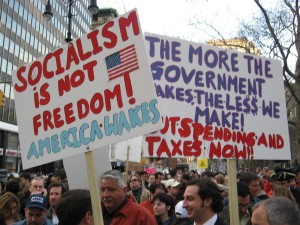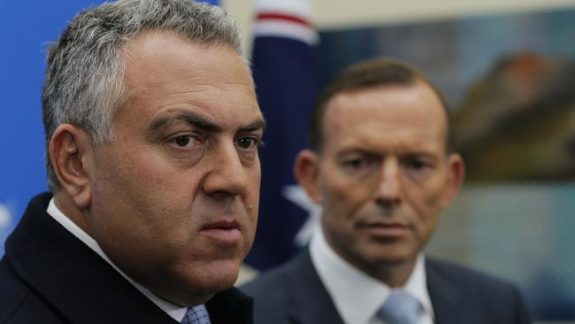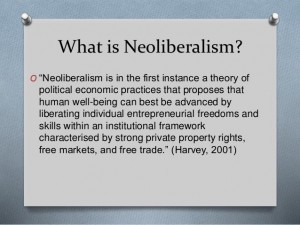Australian and Global Political Subversion, Global Corporatism and Neo-Liberalism

Is Australia on its way to becoming a plutocracy? Andreas Bimba investigates and discovers that the answer is a frightening ‘yes’.
The neo-conservatives in the Australian Liberal, National and Labor (yes Labor) parties are not just more right wing than before, they through their actions rather than their words appear to be disciples of the Institute of Public Affairs and other nests of this poisonous ideology such as the Tea Party in the US. I suspect that these people are on the balance of probabilities trying to subvert our democracies with many parallels with the methods used by a rather famous Austrian in Germany many years ago.
This ideology can be called global corporatism or neo-liberalism, it doesn‘t sound as scary as communism or fascism but give it some more time and we may see. It‘s a lot more than being just about economics, I suspect it‘s actually also about political subversion of the worlds democracies and even many of its dictatorships.
How could this be true and why would these people do such a thing? After all many nice old grannies would love to have Tony Abbott as a pet.
Just think if all the world‘s nations were all neutered so that laws that benefited citizens could no longer be passed. Does this sound like the current US Senate and Congress to you? This means that corporations are then FREE to accumulate wealth and do as they please unencumbered by taxation, regulations, red or green tape, any courts, labour laws, environment protection laws, international laws, high wage costs or international institutions like the UN and the international court of justice and indeed any laws. Total freedom or corporate nirvana? Gee I would vote for that, freedom is good and even more freedom is gooder or something like that and besides everyone knows socialism is the root of all evil. Rupert keeps telling me this so it must be true, I think, oh that hurt, no more thinking just do what he says, yeah that‘s it and God bless Ame…
US President Barak Obama and his current Democrat government as well as a small number of brave politicians may be the last remnants of genuine democracy (i.e. for the benefit of the people) at the national level in the United States but don‘t forget that this government also fears the power of the corporations which probably explains why they are also pushing for the Trans-Pacific Partnership (TPP) and are also still promoting neo-liberalism economics at least half heartedly.
The United States is well on the way to becoming a plutocracy but countries like Australia are not far behind. In the US, politics has become so warped that proponents of governments acting in the best interests of the people, compliance with the constitution and for the correct functioning of the democratic system of government, are derided perversely as socialists or even communists. If anything it is those that pull the levers behind the Tea Party movement that are trying to subvert democracy in the US (& globally) and implement the fundamentally undemocratic and totalitarian ideology of global corporatism.
I suppose the logical end point of this perverted political subversion is something like a more capitalist version of George Orwell‘s 1984 or Aldous Huxley‘s Brave New World. A particularly horrible world that even it‘s proponents will eventually live and die miserably in.
The fossil fuel industry is probably the main driver behind this suspected political world wide coup d‘etat for an obvious reason. They no doubt think that they stand to lose a lot of money if CO2 emissions are effectively curtailed to prevent catastrophic climate change and they are right only up to a point in time; as it is the Earth that will stop them in the end and destroy their wealth in any case if they can‘t be restrained.
I‘m interested to know on which planet those behind this suspected insanity of unconstrained burning of fossil fuels intend to live if they are allowed to wreck this planets eco system? The financial wealth of the fossil fuel corporations will also in the end come to nothing if they do succeed in their apparent perverse aim of burning all the world‘s fossil fuel reserves. The human species is indeed the most dangerous and destructive of all but we simply cannot allow this to come to pass.
Not all corporations are evil like much of the current fossil fuel industry, most are actually quite ethical and are just acting in their own best interests as indeed they should. Why pay taxes when the tax laws are so designed that you no longer need to pay tax by using a little imagination?
The rule of law has not yet been subverted in Australia, but Queensland under former Premier Campbell Newman got close and Tony Abbott and his less obvious friends like Bill Shorten, yes Shorten, are working around that problem at this very moment.
Current examples of steps (either in part or totally) that have been undertaken or proposed by either the Liberal and National Party conservative coalition and the Australian Labor Party while in government to strengthen the march toward global corporatism in Australia are: the free trade agreements; the dogmatic and blind promotion of total world free trade and globalisation regardless of contrary economic evidence; the Trans-Pacific Partnership (TPP); the anti-terrorism (also read anti-environmentalist and anti-citizens rights laws); the ever increasing capacity and scope of state security bodies to spy on, arrest and detain citizens that have not actually broken any laws; the attempts to prevent access by citizens to a truthful, independent and relevant media (cuts to the ABC, attempts to destroy Fairfax, access only to media pulp, infotainment and partisan political propaganda from Rupert and friends); the attempts to destroy the freedom of the internet; restriction of the use of social networking such as facebook and twitter by broadly defined so called enemies of the state; the demonisation of labour unions and tough laws designed to neuter them; selective policing and law enforcement for example environmentalists are beaten and thrown in jail while those responsible for major financial fraud usually escape sanction; the use of scapegoats and the exploitation of fears, demonisation and bigotry such as we have witnessed concerning refugees arriving by boat and also against muslims, welfare recipients and even scientists that believe in evolution (again that famous Austrian also did the same but with a different range of scapegoats) and the bribing/lobbying of politicians, public officials and political parties.
So what do we as concerned citizens do? Firstly hold our politicians to account. Never vote for those that conspire against us. Fight to seperate our politicians from the corrupting influence of money and corporate power. Fight for the independence of, and for truth in, the mass media. Assist with the development and growth of political parties with integrity such as the Australian Greens. Get active and above all, vote only for parties that have integrity.
Currently citizens throughout the world are behaving like confused scared sheep and are foolishly letting the wolves feed us with their lies, scare and intimidate us and rule over us.
In the US, the wolves (promoters of global corporatism) current front organisation is the Tea Party movement. The lies, half truths and worst of all logic reversals (eg. say you support freedom while subverting democracy) of the Tea Party movement must be exposed and this movement must be driven into oblivion.
Unlike the Tea Party movement I truly believe (rather than pretend to believe) in individual liberty, the private enterprise system, prudent management of budget deficits, low taxes, the minimisation of government mismanagement, the minimisation of corporate mismanagement and value for money for government services as well as free education and a comprehensive social welfare/medical/aged care system but I don‘t believe in policies that act only to benefit the most affluent and that discard human beings like municipal waste nor do I believe in global corporatism, neo-liberalism, total globalisation, the unconstrained burning of fossil fuels and the subversion of our free media, right to privacy, freedom of speech, thought and expression, subversion of our democracies and of our institutions.
US Senators and Congressmen could also learn the novel idea that they should always act in the best interests of citizens in their electorates and of citizens of the nation and not external entities like corporations and lobbies.
For those countries like Australia where the independent rule of law still applies and the mechanisms of democracy still more or less operate, it should be relatively easy to chase the wolves (promoters of global corporatism) out of our lives if and when the electorate chooses to exercise its power. For countries that currently have political dictatorships the struggle will in most cases unfortunately be more bloody and difficult.
In regard to international trade; total free trade or total globalisation is not the answer nor is strong trade protectionism, high tariff walls and isolationism. The former generally leads to extinction while the latter generally leads to stagnation and inefficiency. The answer like for most things is something in between and is a matter of getting the balance right. For countries like Australia that have relatively high wages; moderate tariffs can be used when necessary to enable the survival of highly automated manufacturers such as the white goods industry or the automotive industry, that face intense competition from high technology and low wage competitors located in China and Thailand for example. Perhaps these nations won‘t object to the application of some economically balanced Yin and Yang philosophy, after all they practice this approach themselves.
Moderate trade protection should ideally not be designed to prevent international competition but to limit market penetration to a predefined level that still allows worthy local suppliers of goods and services to survive. This actually creates a level playing field for local suppliers of goods and services in the face of very tough foreign competition. This approach is nothing new and an example is the Swedish truck manufacturing industry which is able to manufacture in Sweden and export globally despite relatively high labour costs.
Not all sectors require trade protection. In Australia examples that can survive due to product complexity, local R&D and innovation are the medical devices industry and the pharmaceuticals industry. Other sectors of the Australian economy that can survive without trade protection or substantial subsidies due to natural advantages and high levels of productivity are the mining and bulk agricultural commodity sectors and parts of the building materials manufacturing industry. In addition much of the economy such as construction, government services, education, health and aged care are not significantly affected by foreign competition.
Some thought needs to be given to the possibility of excessive and unrestrained competition through the use of the internet. Current examples are the use of call centres that provide corporate customer support in Australia by using english speaking providers located in India and the Philipines. Information based professions such as engineering, architecture, accounting, some medical services, software programming, IT support and similar can be provided for customers in Australia by much lower cost but technically competent developing world suppliers. Again a balanced regulated approach will probably produce the best outcomes rather than blanket bans or just leaving it to a greed dominated market.
Australia has not done a good job with developing a good national industrial policy environment for the development of industry with the exception of the urgent period of economic development necessitated by the onset of the second world war and the immediate post war period. Craig Milne of the Australian Productivity Council has written many excellent articles on this subject and his conclusions are equally valid for the new sustainable economy. As a consequence of poor national industrial policy settings the value adding manufacturing and associated services sectors of the Australian economy has not developed to anywhere near its potential and in fact it has been deliberately set up to fail by neo-liberal politicians like former Treasurer and Prime Minister John Howard. Subsequent governments have all followed the same destructive industrial policy settings but in the case of the automotive industry they have lowered the pain level for the industry by the haphazard application of government grants which unfortunately resulted in an increase in public resentment.
One can learn a lot from how other countries, also with relatively high labour costs, such as Japan, Germany, Singapore and the Scandinavian countries have achieved great success in the area of value adding manufacture and associated services in the face of tough competition from low wage and high technology economies. In these countries all levers of government such as higher education, research institutions, trade protection where necessary, loan assistance and direct investment, targeted regulation, tax exemptions, strategic planning, strategic purchasing and so on are used to assist and build pillar industry sectors. This type of support initially costs money but it is returned to the economy and to tax payers many times over through extra employment, national economic expansion and ultimately increased tax revenue as well as avoidance of wasteful social support for the unemployed. These expanded or new industries then form the productive income generating core of these aformentioned nations economies that can then be used to support essential government services such as education, health, welfare, pensions and defence.
Suitable pillar industries for Australia are renewable energy, renewable fuels for transport, mining, agriculture, building materials, housing, construction and urban development, municipal and public works, environmental protection and management, education, health and aged care, niche ship building, aviation services and aircraft production, trains/trams/buses/trucks, public transport, automotive, white goods, defence equipment and support, processed foods, fibre, paper and forest products, minerals processing, steel, aluminium and other metal production, plastics and petrochemical, tourism, retailing, medical devices, pharmaceuticals, machinery manufacture, some consumer products, some clothing and footwear, electronics and computing, the arts, film, media, music and entertainment and many more. These pillar industries must constantly innovate and where appopriate spin off new businesses and new areas of economic activity. In the not too distant future Australia should be short of suitably qualified workers as Japan is now.
In Japan the Ministry of Economic Trade and Industry (METI) is a highly successful example of the coordinating body that implements this type of approach. Swedish born Professor Goran Roos who now works for the Swinburne University of Technology in Melbourne has written extensively on this subject.
Socialism is not the optimum economic system but nor is unregulated capitalism. Again balance is the answer and a mixed public and private economy will produce the best outcomes for citizens, the nation as a whole and also for corporations as the consumer market size and diversity for goods and services is maximised. Again the Australian Greens core philosophies of balance, compassion, justice, individual freedom and consensus will deliver the best outcomes.
About the author: Andreas Bimba is a mechanical engineer and former employee of Toyota Australia‘s manufacturing operations in Melbourne and a member of the Australian Greens. This article does not necessarily reflect the current policies and views of the Australian Greens.












